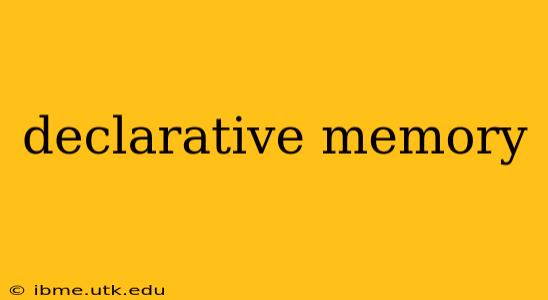Declarative memory, also known as explicit memory, is one of the two major types of long-term memory. It's the system responsible for our conscious recollection of facts and events. Think about remembering your childhood birthday parties, the capital of France, or the plot of your favorite movie – that's all declarative memory at work. Unlike procedural memory (which governs skills and habits), declarative memory involves intentional and conscious retrieval of information. This post will explore the intricacies of declarative memory, answering common questions and delving into its underlying mechanisms.
What are the different types of declarative memory?
Declarative memory is further subdivided into two key categories:
-
Episodic Memory: This refers to our memory of personally experienced events, including the time and place they occurred. It's essentially your autobiographical memory – recalling your first day of school, a memorable vacation, or even a specific conversation you had last week. It's richly contextualized, attaching emotions and sensory details to the event.
-
Semantic Memory: This encompasses our general knowledge of the world, including facts, concepts, and meanings. Knowing that Paris is the capital of France, understanding the principles of gravity, or remembering the names of the planets – these are all examples of semantic memory. This type of memory isn't tied to specific personal experiences; it's a vast storehouse of generalized information.
How does declarative memory work?
The neural mechanisms underpinning declarative memory are complex and still being actively researched. However, the hippocampus plays a crucial role in the encoding and consolidation of new declarative memories. This brain structure acts as a kind of temporary holding area, processing new information before it's transferred to other cortical regions for long-term storage. Different parts of the cortex store different aspects of a memory – visual information in the visual cortex, auditory information in the auditory cortex, and so on. The hippocampus acts like an index, allowing us to retrieve these distributed pieces of information as a cohesive memory.
What are some examples of declarative memory?
Let's illustrate with some concrete examples:
-
Remembering your wedding day: This is episodic memory, recalling a specific event, loaded with sensory details and emotions.
-
Knowing the chemical formula for water (H2O): This is semantic memory, a piece of general knowledge unrelated to a personal experience.
-
Recalling the plot of "Hamlet": This blends elements of both episodic (if you saw a specific production) and semantic (general knowledge of the play's themes and characters) memory.
-
Remembering your first pet's name: This is typically episodic, recalling a specific personal experience.
What are some common problems with declarative memory?
Difficulties with declarative memory can manifest in various ways, often resulting from brain injury, neurological disorders, or aging. Amnesia, for instance, can severely impair the ability to form new declarative memories (anterograde amnesia) or retrieve old ones (retrograde amnesia). Other conditions, such as Alzheimer's disease, can progressively damage declarative memory systems, leading to significant cognitive decline.
How can I improve my declarative memory?
While aging can affect memory, proactive strategies can help improve or maintain declarative memory function:
-
Engage in mentally stimulating activities: Reading, puzzles, learning new skills, and playing memory games can all strengthen neural connections.
-
Get sufficient sleep: Consolidation of memories occurs during sleep, so adequate rest is crucial.
-
Maintain a healthy diet and lifestyle: Proper nutrition and exercise benefit overall brain health, including memory.
-
Practice mindfulness and stress reduction: Chronic stress can impair memory function, so techniques like meditation can be beneficial.
Can declarative memory be lost?
Yes, declarative memory can be lost or impaired due to various factors, including:
-
Brain injuries: Trauma to the brain, such as a concussion, can disrupt memory function.
-
Neurological disorders: Conditions like Alzheimer's disease and dementia significantly impact declarative memory.
-
Substance abuse: Excessive alcohol or drug use can damage brain cells and affect memory.
-
Aging: While some memory decline is a natural part of aging, significant impairment can indicate underlying health issues.
Understanding declarative memory provides crucial insights into how we learn, remember, and interact with the world. By exploring its intricacies and adopting healthy habits, we can strive to maintain and enhance this essential cognitive function throughout our lives.
